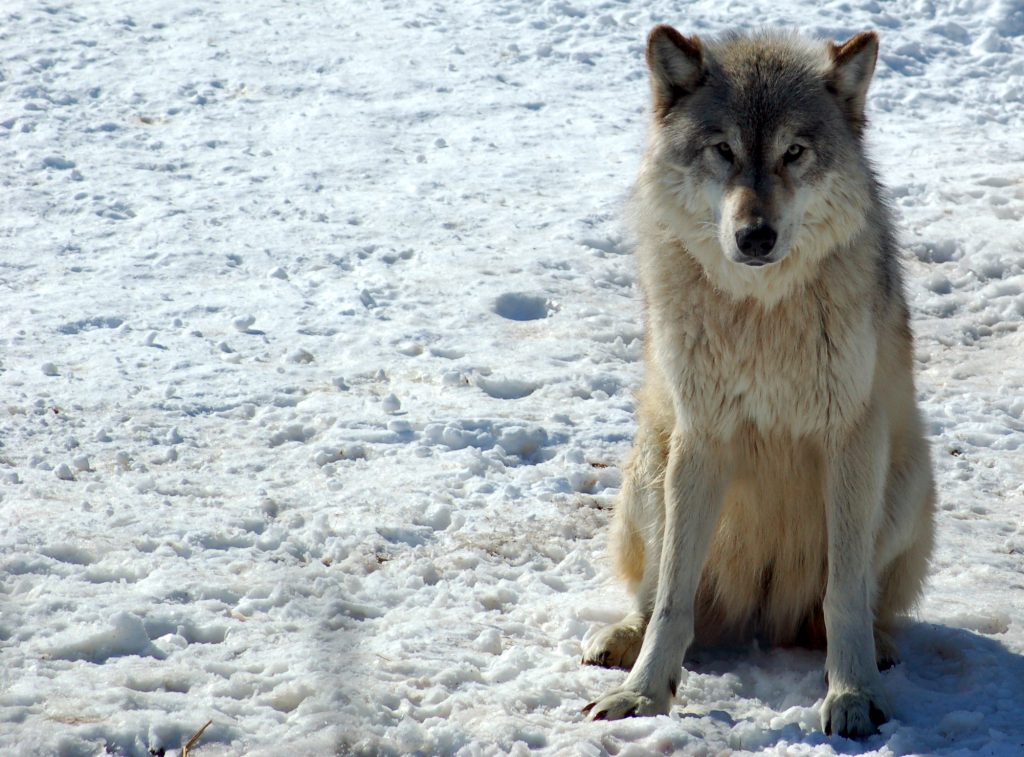Judge Says State Wolf Hunt Law May Be Unconstitutional
Animal rights groups suing to overturn law allowing annual wolf hunt.

Gray wolf. Photo by Derek Bakken / (CC BY)
A Dane County judge on Thursday indicated he’s likely to declare the law governing Wisconsin’s wolf hunt is unconstitutional because it has been operating under emergency rules since 2012. An oral ruling on the matter is expected Friday afternoon.
During a virtual hearing on Thursday, Dane County Circuit Court Judge Jacob Frost heard arguments by attorneys representing animal rights groups, the state Department of Natural Resources and Hunter Nation, which supports wolf hunting in Wisconsin, in a lawsuit seeking to overturn the 2012 law that requires the DNR to hold a wolf hunt whenever the animal isn’t listed as a federally protected endangered species.
During the hearing, attorney Claire Davis, of the Seattle-based firm Animal & Earth Advocates, said emergency rules can only be put into effect by state agencies for 150 days after an emergency has been identified, “neither of which we have here.”
“So, we’ve taken away both the safeguards that would be in place for permanent rulemaking and the safeguards that would be in place for emergency rulemaking to prevent either one from being an impermissible delegation,” Davis said.
Frost seemed to agree and said the law has created a “bizarre situation” where the DNR has never gone through the full process of creating a permanent rule to regulate wolf hunting.
“And though, right now, that’s upsetting people who are against the hunt,” said Frost, “it could be next year or the year after that that it upsets people who want to have the hunt because DNR is now doing something that they don’t like.”
Frost also said the law, as written, could allow the DNR to set a wolf hunt quota of zero or close wolf hunts on the same day it’s opened.
Wisconsin Department of Justice Assistant Attorney General Hannah Jurss represented the DNR in the hearing and pushed back against the interpretations of Davis and Frost.
“It’s not a non-delegation problem for the Legislature to tell the Department of Natural Resources, ‘Have a wolf hunt.’ It’s not a non-delegation problem for the Legislature to tell the Department of Natural Resources, ‘Issue wolf hunt licenses,'” said Jurss.
Rather, Jurss said the animal welfare groups’ argument is really about how the DNR has implemented the directive from state lawmakers.
Frost appeared ready to rule the law unconstitutional, which could potentially block a wolf hunt scheduled to start Nov. 6, until Jurss mentioned such a ruling could be overturned on appeal and potentially cause the unintended consequence of triggering another rushed wolf hunt next February during the wolf breeding season.
Last February, a Jefferson County Circuit Court judge ordered the DNR to hold a wolf hunt and state-licensed hunters killed nearly twice the 119 wolf quota in less than 72 hours during the animals’ usual breeding season. The judge’s ruling occurred after wolves came off the endangered species list in January 2020 and the same month that the Natural Resources Board narrowly voted not to hold a hunt because it was during breeding season. Ultimately, some hunters and Hunter Nation sued, seeking to hold the hunt immediately.
After a short recess, Frost returned and asked attorneys for the state, the animal welfare groups and Hunter Nation to submit short briefs outlining what standards they would like to see applied if an injunction is placed on the law regulating the state wolf hunt. Frost said he will review the briefs and issue an oral ruling during a hearing at 3:30 p.m. Friday.
The DNR has faced multiple legal challenges from groups supporting and opposing state wolf hunts. In September, six Ojibwe tribes in Wisconsin filed a federal lawsuit against the agency claiming their treaty rights are being violated by the upcoming November hunt. The suit argues the state allowed non-tribal hunters to kill too many wolves during the February hunt, thereby threatening the share guaranteed to tribes under treaty law. The Ojibwe consider the wolf a brother and the tribes seek to use their half of any quota set by the DNR to protect the animal.
Dane County judge seems to indicate 2012 wolf hunt law is unconstitutional was originally published by Wisconsin Public Radio.






















Trump removed wolves from the endangered species list.
Joe Biden could put wolves back on the endangered species. That would end the wolf hunt.
Joe Biden refuses to overturn Trump’s decision.
The Wisconsin wolf hunt is scheduled for November 6, 2021 because of Joe Biden.
Joe Biden is a worthless piece of excrement.